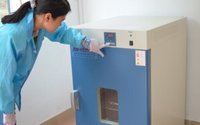What aspects does material performance testing include?
Date:2023-08-18 15:52:00Views:433
Material performance testing is a comprehensive evaluation method for materials, which can help engineers and scientists determine the strength, hardness, corrosion resistance, wear resistance, and other key properties of materials. Thus providing support for the design and application of materials. This article summarizes some materials and hopes to provide valuable references for readers.
Material performance testing typically includes the following aspects:
1. Strength testing: Strength testing is the evaluation of a material's resistance to external loads, which can help determine parameters such as tensile strength, yield strength, compressive strength, and shear strength. Strength testing can be carried out using equipment such as universal testing machines, press machines, and shear testing machines.
2. Hardness testing: Hardness testing is an evaluation of the resistance of materials to surface pressure, which can help determine parameters such as hardness, elastic modulus, and plastic deformation of materials. Hardness testing can be conducted using equipment such as Rockwell hardness tester, Brinell hardness tester, and Vickers hardness tester.
3. Corrosion resistance test: Corrosion resistance test is a method of evaluating the stability of materials in corrosive media. These tests can help determine the corrosion resistance of materials and provide guidance for their application. Corrosion resistance testing can be carried out using equipment such as salt spray testing machines, electrochemical corrosion testers, and corrosion test tanks.
_20230818155101_868.jpg)
4. Wear resistance testing: Wear resistance testing is an evaluation of a material's resistance to wear, which can help determine the material's wear resistance and provide guidance for its application. Wear resistance testing can be conducted using equipment such as wear testing machines and friction and wear testing machines.
5. Thermal performance testing: Thermal performance testing is a method of evaluating the performance of materials in high-temperature environments. These tests can help determine parameters such as thermal expansion coefficient, thermal conductivity, and thermal stability of materials, thereby providing guidance for their application. Thermal performance testing can be conducted using equipment such as thermal expansion meters, thermal conductivity meters, and thermogravimetric analyzers.
6. Density testing: Density testing is a method of evaluating the density of materials. It can help determine parameters such as density and relative density of materials, thereby providing guidance for their application. Density testing can be conducted using equipment such as density meters and pyknometers.
7. Acoustic testing: Acoustic testing is a method of evaluating the acoustic performance of materials. It can help determine parameters such as sound velocity, sound absorption coefficient, and sound propagation performance of materials, thereby providing guidance for their application. Acoustic testing can be conducted using equipment such as acoustic testers and acoustic chambers.
The above is the material performance testing related content organized by the Chuangxin Testing editor, hoping to be helpful to you. Chuangxin Testing is a professional testing institution for electronic components. Currently, it mainly provides integrated circuit testing services such as capacitors, resistors, connectors, MCU, CPLD, FPGA, DSP, etc. Specializing in functional testing of electronic components, appearance testing of incoming electronic components, anatomical testing of electronic components, acetone testing, X-ray scanning testing of electronic components, and ROHS composition analysis testing. Welcome to call, we will be happy to serve you!




 Weixin Service
Weixin Service

 DouYin
DouYin
 KuaiShou
KuaiShou




















